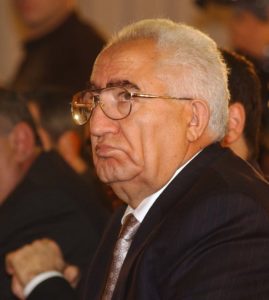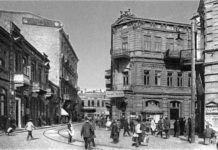This interview first was published in The Armenian Reporter, December, 2008. Vladimir Movsisian passed away in November 5, 2014.

_____________________________
“The buildings we constructed did not meet the seismic standards of Armenia”
In December 1988, when the devastating earthquake shook Armenia, Vladimir Movsisian was the deputy prime minister. As a high-ranking official he personally participated in efforts to manage the wreckage left by the earthquake. Mr. Movsisian’s parental home in the village of Shenavan was located just a few kilometers away from the village of Shirakamut, which was the epicenter of the earthquake. Mr. Movsisian’s brother and dozens of his relatives died during the disaster.
A few days ago Mr. Movsisian turned 75. After serving as deputy prime minister, he was, from April 1990, first secretary of the Central Committee of the Communist Party of Armenia, which was the highest post in Soviet Armenia. For a short time he was the deputy agriculture minister of the Soviet Union. After the collapse of the Soviet Union, he remained in politics and became head of the department that handled refugee issues in independent Armenia, governor of the Gegharkunik province, and, for three years, minister of agriculture.
The Armenian Reporter’s Tatul Hakobyan spoke to Mr. Movsisian this week.
Armenian Reporter: Mr. Movisisian, prior to talking to you I once again went though your memoir. A section in the book is about the December 1988 earthquake. I have read numerous books and articles about the earthquake and heard the tragic stories of hundreds of people, but I was profoundly moved by this sentence from your memoir: “Even today I cannot forget that during my brother’s funeral, a truck was transporting about five to six children’s coffins, and the truck was followed by five to six people.” Today, 20 years after the tragedy, what do you recall when you talk about the earthquake?
Vladimir Movsisian: Twenty years ago our nation went though yet another tragedy in its history. The devastating earthquake took the lives of 26,000 of our compatriots. Thousands of people became homeless. Thousands of families became orphans, suffocated, or were disabled.
A personal tragedy
For me December 7, 1988, is just like yesterday, as that disaster has been strongly imprinted in my brain. Maybe this is because I lived the tragedy twice. I consider myself a patriot, and I lived the disaster with my nation. I also had a personal tragedy. My relatives, my brother, my paternal uncle, and my maternal aunt’s sons: 57 people died in just a few seconds. I do not say this so that people feel sorry for me. No, I do not like pity, as every person has his own destiny, his grief, his burden, and should bear his own cross. Recently my son passed away. [Vahagn Movsisian was Armenia’s ambassador to China when he died.] Every person should be able to bear and confront the blows of destiny. If you fail to bear them, destiny will throw you down and crush you. That is my nature, which comes from the character of our nation.
Overcoming disasters is in our nation’s genes, which we have inherited from generation to generation. During the earthquake, our nation bore the disaster.
Let me bring the example of Paylak Karapetian, one of the elders in our family. He lived in our village, Shenavan (in the Spitak district of Lori province). During the earthquake he lost his wife, son, daughter, and 13 grandchildren. When some time had passed after the earthquake, I asked him how he had survived. (He was removed from under the ruins.) He answered that the Gospels had saved him. In 1915, during the Armenian Genocide, he had brought the Gospels printed in Venice, which is in their house to this day, from Kars, hidden against his chest.
I asked him, “How are you going to bear this pain?” And he answered that he still had 12 years to live until he turned 100. He said that he had to live, no matter what. And he lived 44 days less than 100 years. Surviving is in our nation’s genes.
Secondly, our nation has a unique character. When Mikhail Gorbachev came to Gyumri a few days after the earthquake, people asked him about Karabakh. He got angry and told them that he had gone to Gyumri to ask them how he could help. But people had put aside their grief and were asking him when he was going to solve the Karabakh issue. Our people’s personal lives come after national issues. I am proud of our nation’s tenacity for life.
AR: When did you find out about the earthquake?
VM: The Bureau of Armenia’s Central Committee was in session that day. The deputy prime minister of the USSR was in Yerevan. I was to present a report on the results of resettling the refugees [who had fled Azerbaijan during the course of 1988.] At 11:45 a.m., the Central Committee building also shook. The Bureau session was terminated. A little later we found out that a very strong earthquake had taken place in the north of Armenia.
The priorities
AR: How did the Soviet Union respond? Was Moscow prepared to confront such a disaster?
VM: Right after the earthquake a headquarters was set up, led by Nikolai Ryzhkov, the premier of the USSR. They were working on the main issues.
The first was saving lives works, clearing the rubble, and providing medical help to the injured.
The second was finding shelter for those who had suffered, since thousands of people were left homeless. In order to provide shelter for people, Armenia’s hotels, sanatoria and schools were used. We organized the transportation of temporary housing (domiks) to Armenia from all over the Soviet Union. Apart from that, thousands of people found shelter in different parts of the USSR.
The third main issue was starting the renovation efforts in the disaster zone. A lot of work was carried out, headed by Nikolai Ryzhkov. He lived through the tragedy of the earthquake with us. Apart from helping Armenia economically, materially, and financially, Ryzhkov also shared the grief and lived the tragedy. He was shocked and did everything to restore the economy as soon as possible.
Substandard construction
AR: Why did the earthquake cause damage on that scale? Today much is being written and said about how more could have been done to reduce the numbers of dead.
VM: It was a very strong earthquake. It is not a secret that the quality of the construction did not meet the standards set for a seismic zone. There were two reasons for that.
First of all there was a Soviet Union–wide norm for apartment construction: the price of a square meter should not exceed 180 rubles. You could not exceed that sum. In other words, from the very beginning, the norm of constructing low-quality and seismically unsound buildings had been set.
Second, the quality of the construction did not correspond to the already low norm. There was no free market selling construction materials to the private sector, and so they obtained [stole] materials from state projects. The quality of the buildings we constructed did not meet the seismic standards of Armenia. We were unprepared for the earthquake both from the organizational and operative points of view. We did not have a strong seismology agency with complex structures for rescue and first aid. This was also a reason for that number of deaths.
AR: Mr. Movsisian, what lessons should we learn from the 1988 devastating earthquake?
VM: From the point of view of learning lessons, we, the Armenians, are lazy and forget everything very early.
First, the entire norms and demands for construction should be reviewed and they must correspond to Armenia’s level of seismic activity. Nothing should be constructed unless it is seismically sound for up to 9 points on the Richter scale. Even a fence should not be constructed, as it is costly and when it is ruined you have to construct it again.
Second, the construction quality should be monitored by the state, as the state is responsible for its citizens. If the quality does not comply, the building should not be put into use.
Third, people should be removed from today’s damaged buildings and schools, as no one can be sure how strong tomorrow’s earthquake may be.
One of the reasons many people died during the earthquake was the lack of rescue services. The Ministry of State of Emergency should solve some issues: forecasting, disseminating information, and it should be on the alert. The Russians have a good saying, “They feed the dogs only when they want to go hunting.” We shouldn’t be in that position.
AR: Thank you.
The Armenian Reporter, December, 2008












